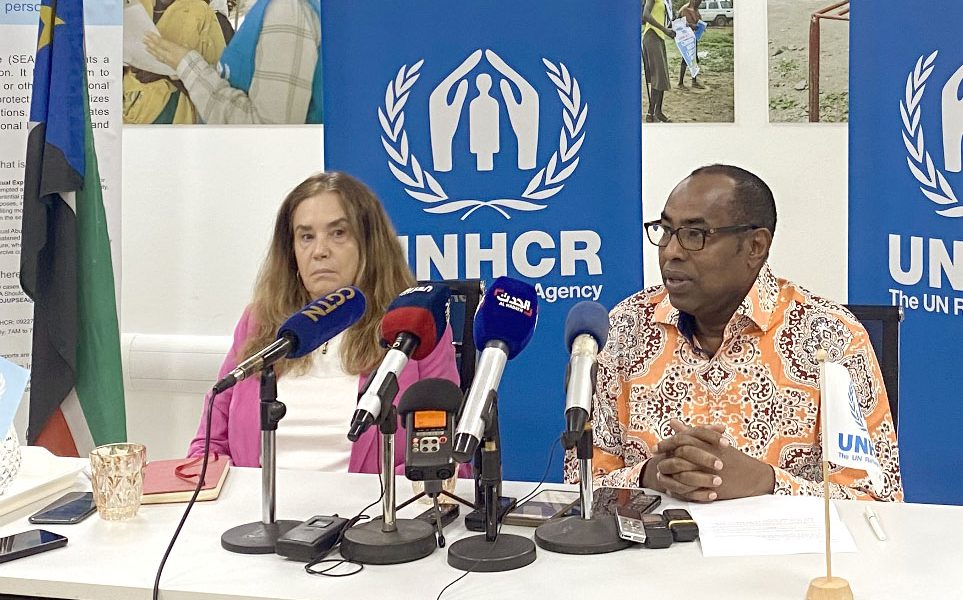By Gladys Fred Kole
UNHCR special envoy to the Horn of Africa, Ambassador Mohammed Affey highlighted the need for continued effort on durable answers for millions of people forced to flee in and from South Sudan.
Mr. Affey emphasized that beyond humanitarian action, creation of conditions for returnees and recovery is critical to building durable peace, stability and achieving sustainable solutions for the displaced.
The envoy told the media on Thursday that his visit is in solidary with South Sudan, following the massive impact of the Sudan conflict that this country continues to experience.
“It is important to keep the momentum of the Sudan and South Sudan solutions initiatives for refugees, returnees, IDPs and host communities,” the UN envoy said.
He said there is a need to leverage the IGAD framework on the initiative to galvanize international support for a regional approach to deliver solutions for newly displaced populations.
Mr. Affey, during his visit to South Sudan, toured Malakal, a place that is a microcosm of the coinciding crisis, inter-communal violence, flooding, internal displacement and an influx of arrivals from Sudan.
The visiting UN envoy said UNHCR, and its humanitarian partners are fully committed to supporting the South Sudan government in the reception of refugees and returnees.
“They are also actively engaging with development actors and the private sector to foster the seamless integration and inclusion of refugees, returnees and IDPs.” Affey continued.
He stated that UNHCR continues to cater for over 2.2 million South Sudanese outside who are patiently waiting to return back home.
South Sudan is also experiencing a large number of over 2.3 million IDPs.
Mr. Affey said that the conflict in Sudan continues to impact South Sudan with the daily arrival of over 2,000 refugees and returnees as the number continues to grow.
“Am here to understand the magnitude, impact and gravity of this situation to South Sudan, what we saw is quite devastating in terms of the situation of the people coming,” he noted.
Meanwhile, the UNHCR country representative, Marie-Helene Verney said since mid-April this year, it has been a struggle, ever since the conflict erupted in Sudan.
“We see people who arrive in Renk malnourished with no food and walking for days it is a bad state and the situation is getting complicated,” Marie said.
The UNHCR boss stressed that their biggest priority with humanitarian partners is how to help people move out of Renk.
Key concerns include availability of land for individuals to settle on and cultivate, while providing access to basic services like health and education for returnees.
She said that the returnees also need to have an opportunity to participate in political dialogues and peace processes in the country.
“Although it is a big crisis, we would also like to look at it as an opportunity for humanitarian, peace and development programming in South Sudan,” she hinted.
Marie maintained that the UNHCR and its agencies are prepared with little resources, for now, but entirely dependent on the donors.
“If we don’t receive funds, we are not prepared to receive half a million people.” she underlined.
South Sudan’s refugee crisis remains the largest with over 2.2 million citizens displaced to the neighbouring countries.
On the other hand, over 2.3 million South Sudan’s citizens are displaced within the country while the country itself hosts over 300,000 refugees from neighboring countries.
South Sudan was already suffering from a deep humanitarian crisis prior to the conflict in Sudan, with three-quarters of the population deemed to be in need of humanitarian aid.
The country’s crisis is being fueled by conflict, security concerns, historic flooding food security and failing infrastructure.
Over 180,000 people fled to South Sudan since the start of the conflict in Sudan.
As fighting in Sudan lasts, arrivals are expected to increase with wider manifold impacts of the conflict on South Sudan.
The lifesaving assistance provided by humanitarian partners and the government needs to go along with a more comprehensive response to create conditions to allow displaced populations to rebuild their lives.




